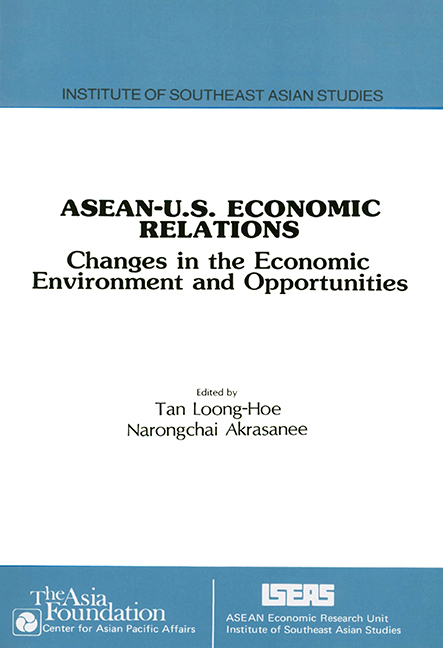Book contents
- Frontmatter
- Contents
- List of Tables
- List of Figures
- Foreword
- Changes in the ASEAN-U.S. Economic Environment and Opportunities: An Introductory Overview
- PART I ECONOMIC TRENDS
- PART II STRUCTURAL ADJUSTMENTS
- PART III TRADE IN SERVICES
- PART IV ROLE OF PRIVATE SECTOR
- 7 U.S.-Thai Relations: Selected Case Studies in Agribusiness
- THE EDITORS
7 - U.S.-Thai Relations: Selected Case Studies in Agribusiness
from PART IV - ROLE OF PRIVATE SECTOR
Published online by Cambridge University Press: 21 October 2015
- Frontmatter
- Contents
- List of Tables
- List of Figures
- Foreword
- Changes in the ASEAN-U.S. Economic Environment and Opportunities: An Introductory Overview
- PART I ECONOMIC TRENDS
- PART II STRUCTURAL ADJUSTMENTS
- PART III TRADE IN SERVICES
- PART IV ROLE OF PRIVATE SECTOR
- 7 U.S.-Thai Relations: Selected Case Studies in Agribusiness
- THE EDITORS
Summary
U.S.-Thai economic relations commenced in 1818 when Thailand bartered sugar for firearms. Since then, trade relations have steadily increased. By 1985 the total Thai trade with the United States reached $2.3 billion.
Previous studies on U.S.-Thai relations centred on trade in manufactured goods, direct investments, and technology transfer in which U.S.-Thai activities are concentrated. However, since President Reagan signed the Food Security Act (H.R. 1210), commonly known as the Farm Bill, which potentially affects the standard of living of 70 per cent of the Thai population who are mostly rice farmers, the future of the U.S.-Thai relations depends to a large extent on the resolution of conflicts arising from agricultural trade and possible co-operation in rice and other agribusinesses.
This paper examines the relationship between U.S. and Thai companies in agribusiness in Thailand. Adopting a case-study approach the paper argues that the U.S.-Thai relationship in agribusiness is not merely competitive but is multidimensional and this property should be exploited properly. It is suggested that both countries would gain from free and fair agricultural trade and from combining comparative advantage of the different chains of production in agribusiness. The case studies will highlight both the competitive and the possible co-operative nature of the relationship.
Overview
Despite an apparent difference in factor endowments and in the relative importance of the agricultural sector measured in terms of value-added contributions in the United States and Thailand, agricultural exports are major foreign exchange earners of both countries. In 1985, the U.S. agricultural sector accounted for only 2 per cent of GDP in 1984 but U.S. farm exports fetched $31 billion accounting for 15 per cent of total U.S. export revenue (Table 7.1). It should also be noted that this share is the lowest during the last two decades. In Thailand, the agricultural sector contributed 20 per cent to GDP (Table 7.2) in 1984 and agricultural exports accounted for about two-thirds of the total value of export earnings since 1978 (Table 7.3).
- Type
- Chapter
- Information
- ASEAN-U.S. Economic RelationsChanges in the Economic Environment and Opportunities, pp. 177 - 200Publisher: ISEAS–Yusof Ishak InstitutePrint publication year: 1988



